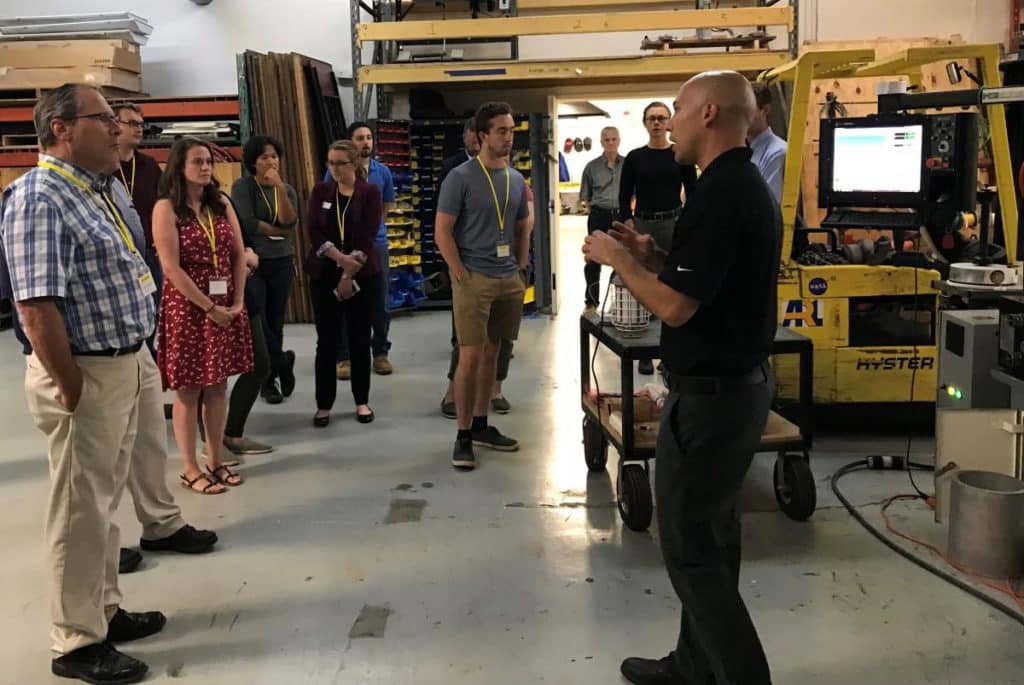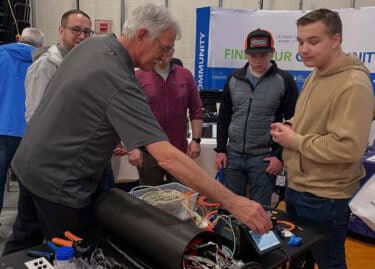NH Community College Students Get AMP-ed Up Through Work-Based Learning Program
NH Advanced Manufacturing Program (AMP) readies students for in-demand engineering jobs
A program that enables community college students to gain paid, real-world experience within their field and then transfer to pursue a four-year degree was recently in the spotlight when students gathered to share their summer work experiences gained through the New Hampshire Advanced Manufacturing Program (NH AMP).

NH AMP is a collaborative project between NH Community Colleges, NH businesses and the University of New Hampshire (UNH). It is built upon a work-based learning-career training model that provides community college students paid work experiences that will advance them toward employment or transfer to UNH to earn a Bachelor of Science in Engineering or a STEM-related program. Participating students receive industry-standard compensation, on-the-job training of critical occupations skills through an eight to ten-week internship, engagement in college activities and counseling on career and transfer options.
Participants in the program this summer included students from three New Hampshire community colleges – Great Bay Community College (GBCC), NHTI-Concord’s Community College and Manchester Community College (MCC) who are pursing engineering degrees in such specialties as mechanical engineering, aerospace, bioengineering, chemical engineering and biophysics. The students came together at Mentis Sciences, Inc., which hosted one of the interns from GBCC.
“My internship opportunity with Mentis Sciences, Inc. was fantastic. I have developed valuable engineering approaches, have seen how STEM looks outside the academic environment and it definitely reaffirmed my interest in engineering. I’ve been lucky to have been taken in by such a dynamic company, and I have acquired a lot of hands-on fabrication skills, along with learning design and economic considerations. For anyone going into mechanical engineering, advanced manufacturing, or material science, I’d say an internship such as this will absolutely offer an invaluable leg up,” said Luciana Custer, who graduated this past May from Great Bay with an associate in science degrees in bioengineering and biotechnology, and is transferring to UNH this fall to continue her studies. She plans to double major in bioengineering and neuroscience.
The NH AMP summer internships come in two forms: research-based opportunities at UNH and those based at host companies including Mentis Sciences, Inc.
“We are training the next generation of skilled workers in the advanced manufacturing sector. Our interns gain a wide variety of engineering experiences. Design/ product development, fabrication, machining, testing and final part inspection are some of the areas our students get to add value and solve real world problems,” said Jonathan Diaz, a manufacturing engineer at Mentis Sciences, Inc. who supervises the intern program.
Another GBCC student, Marguerite Kennish, chose a research-based internship with the Olsen Center for Advanced Manufacturing. She earned her associate degree in Engineering Science and plans to pursue a Bachelor of Science in Mechanical Engineering. The CCSNH students presented at the event alongside interns from UNH, Michigan State University, Rensselaer Polytechnic Institute, UMass Lowell and Quinnipiac University, all studying some form of science or engineering.
“Through this program, community college students are doing the same level of research as students from four-year institutions. The instructors and mentees have also been extremely pleased with the work of our students,” said Leslie Barber, the lead faculty member for the program at GBCC and coordinator of the program for the community college system. “We’re paving the path for these very good students to be able to start with us, be really well prepared, and go on to do great things once they transfer,” she added.
Due to its location, GBCC has a long-standing relationship with UNH and is the university’s largest transfer partner. Over the past decade, many educational pathways have been created that allow students to complete an associate degree at GBCC and seamlessly transfer to UNH to continue their studies. Barber noted the advantage community college students can have by making the early connection to UNH and going through a unique work-based learning experience prior to enrolling. “This hands-on, practical experience enables students to go to UNH with experience under their belt so they can jump right in and join a research group,” she said.
The NH AMP program is a pilot program entering its third year. NH community college students who are eligible for federal financial aid and are looking for an opportunity to use their classroom learning in a real-life setting are encouraged to apply.
For more information contact Leslie Barber at [email protected] or (603) 427-7686.
Photo caption: Jonathan Diaz, a manufacturing engineer at Mentis Sciences, Inc. who supervises the intern program presents to students and discusses the areas they have worked on at the company.
About CCSNH
The Community College System of NH consists of seven colleges, offering associate degree and certificate programs, professional training, transfer pathways to four-year degrees, and dual-credit partnerships with NH high schools. The System’s colleges are Great Bay Community College in Portsmouth and Rochester; Lakes Region Community College in Laconia; Manchester Community College; Nashua Community College; NHTI – Concord’s Community College; River Valley Community College in Claremont, Lebanon and Keene; and White Mountains Community College in Berlin, Littleton and North Conway. The seven community colleges in the system are committed to working with businesses throughout the state to train and retain employees to develop a robust workforce across all sectors and embraces the “65 by 25 Initiative,” which calls for 65% of NH citizens to have some form of postsecondary education by 2025 to meet future workforce demands.



